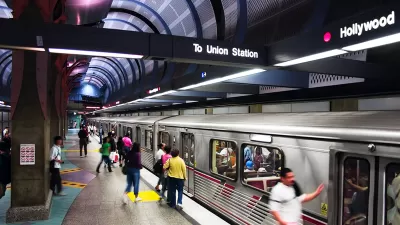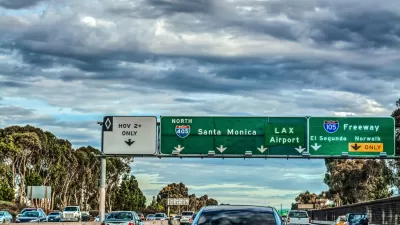After repeatedly cutting transit service due to the pandemic and a labor shortage, L.A.'s transit agency plans to double down on freeway expansion projects.

Joe Linton digs into Los Angeles Metro's Fiscal Year 2022-2023 budget for Streetsblog LA. "While the full budget figures are still in flux, the current proposal shows a 30 percent increase in freeway expansion and a 9 percent decrease in transit expansion," Linton writes. "The overwhelming majority – more than 90 percent – of the FY22-23 proposed $617 million Highway Expansion budget would go to widening freeways, freeway ramps, and streets." The article details the proposed budget, comparing it with the past two fiscal years.
When questioned about the increase in freeway widening funds, "Metro’s staff report notes that the highway funding increase is 'primarily due to construction activities for I-5 North Capacity Enhancements, SR-57/SR-60 confluence, and progression of I-105 ExpressLane to Project Specification and Engineering phase.'" But Linton points out that "the proposed highway budget calls for several other freeway projects to be accelerated" while "many Metro rail and bus projects are delayed."
As Linton notes, "though there are fairly clear lines between capital and operations funding (and it’s difficult to shift some freeway money to rail), this is all happening at a time Metro has repeatedly cut bus operations – first due to COVID, then – last month – due to a largely-self-inflicted operator shortage."
Linton questions Metro's decision to cut transit capital funding in light of the positive fiscal outlook of the agency and its stated commitment to equity and climate action. "Given the need to address the climate emergency, and longstanding freeway expansion equity issues still very much present today, Metro leaders – from its CEO to its board – need to rein in the excesses of freeway expansion programs and double down on greener modes."
FULL STORY: Proposed Metro FY22-23 Budget: Increase Freeway Widening, Decrease Transit Construction

Study: Maui’s Plan to Convert Vacation Rentals to Long-Term Housing Could Cause Nearly $1 Billion Economic Loss
The plan would reduce visitor accommodation by 25,% resulting in 1,900 jobs lost.

North Texas Transit Leaders Tout Benefits of TOD for Growing Region
At a summit focused on transit-oriented development, policymakers discussed how North Texas’ expanded light rail system can serve as a tool for economic growth.

Using Old Oil and Gas Wells for Green Energy Storage
Penn State researchers have found that repurposing abandoned oil and gas wells for geothermal-assisted compressed-air energy storage can boost efficiency, reduce environmental risks, and support clean energy and job transitions.

Texas State Bills Could Kill Transit Funding in Dallas, Austin
State lawmakers could pull funding from the state’s largest transit agency and the ambitious Project Connect, a voter-approved transit project in Austin.

Opinion: DC Encampment Sweeps Hide, but Don’t Solve, Homelessness
President Trump recently ordered the clearing of encampments built by unhoused people on federal land in Washington, D.C.

Santa Barbara Could Build Housing on County Land
County supervisors moved forward a proposal to build workforce housing on two county-owned parcels.
Urban Design for Planners 1: Software Tools
This six-course series explores essential urban design concepts using open source software and equips planners with the tools they need to participate fully in the urban design process.
Planning for Universal Design
Learn the tools for implementing Universal Design in planning regulations.
Ascent Environmental
Borough of Carlisle
Institute for Housing and Urban Development Studies (IHS)
City of Grandview
Harvard GSD Executive Education
Toledo-Lucas County Plan Commissions
Salt Lake City
NYU Wagner Graduate School of Public Service





























